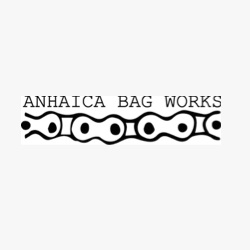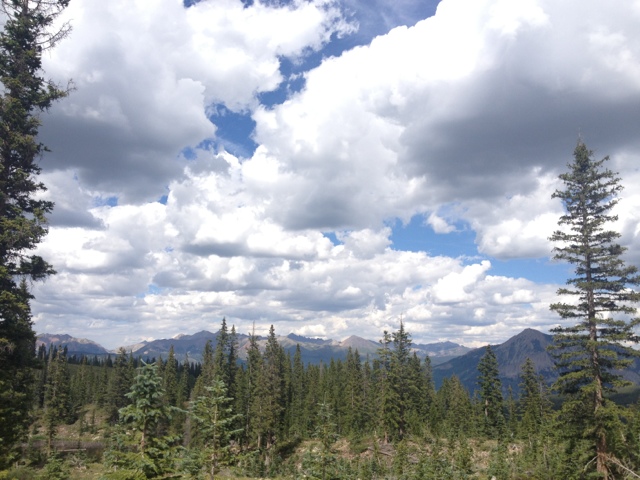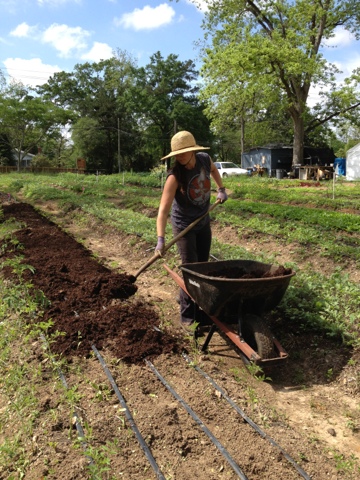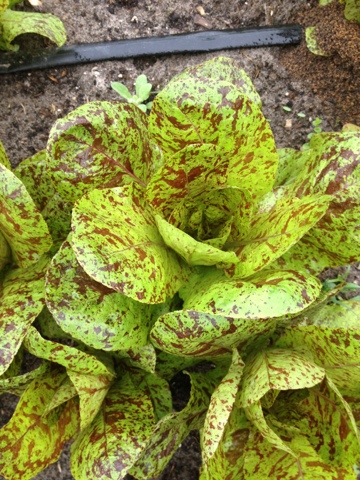It was a descent back into civilization. Aaaand it was depressing. I think this is the first time I’ve seen a city in terms of the rural place that it originated from. Denver is in a desert valley just like like all the other desert valleys I just spent a month riding through. Except this valley is filled with lights and McDonald’s and billboards and an intricate system of highways.
Now I’m not ready to move out to the country or anything. When traveling through some of these rural areas, the thought of living there struck me as oppressive. Oppressive because there is just nothing. Where is the yoga studio? Where can I get brunch on Sunday? How could you I ever visit friends if they live 30 miles away? I live in a small city now, but I lived in Chicago for three years. I really liked it. I liked the lights and the bustle and constant movement. But I only knew Chicago in terms of the city- I didn’t start with the wetlands of the Great Lakes and the empty places of Wisconsin and Michigan. It was easy to disassociate the cement with wild place it used to be.
Even the thought of the ariel view from Florida was contextualized differently. From the plane, our landscape is pockmarked with lakes, cut through with snaking rivers, surrounded by an ever-rising blue ocean, blanketed in trees. And then there are these deformities junking it all up— straight grey highways, asphalt wastelands, and subdivisions. GOOD LORD THE SUBDIVISIONS. Our whole state is a swamp, and we’ve spent the past 200 years draining it to make it habitable. We’ve done a great job of it, clearing out mangroves so we can be left wide open to the track of hurricanes, draining marshland for cattle grazing so the runoff can pollute our waterways, developing our cities till they are an indistinguishable blob of Starbucks and Hobby Lobby.
As we descended the last mountain range the houses littered the highway in messy clumps. It seemed like every other yard had a scrap heap out back. The power lines transformed from a solitary telephone wire to a tangle of crisscrossing towers. Then we passed a modern day mine, today’s answer to all the turn of the century mines that gave Southwest Colorado a reason to be inhabited. Well they blew up a mountain to extract molybdenum, and all the water and dirt and rock leftover from the blasts is filling up the valley. But we can’t make steel without molybdenum, so we have to keep mining it.
There are no easy fixes for Colorado or Florida or the planet. I’m not gonna spout conservationist lingo about going green by buying fancy products or switching to solar. None of that will fix anything. The only thing that will work is every human being on the Earth changing their idea of what land means— it’s not a commodity to be traded for greater economic development or a set of disparate objects waiting for us to use it.
It is, in fact, what Deep Ecology and almost every indigenous culture on the planet claims it to be, which is a complicated web of habitats, natural forces and life that have inherent worth regardless of their use to human beings. That comes in to focus much more clearly after spending time away from lots of people, waking up with the sun, and reading Travis’ book of Indian narratives in which native people lament the loss of everything bountiful and beautiful at the coming of the White culture.
But whatever. I’m not a climate activist. I haven’t made my career by organizing people to fight our imminent collapse. I drive a car way too much; I take cross-country flights; a good portion of my life is taken up with buying things. I do, however, make my living in a way that I feel good about, and I get to do my small part of education by the way that I farm.
I don’t use synthetic chemicals to fertilize my crops, kill unwanted insects or destroy weeds. I don’t use genetically modified seeds, and I do my best to not buy processed food (which in America means it contains GM ingredients 99% of the time). I educate my friends, family, and customers about eating locally to cut down on carbon emissions which are a result of buying tomatoes that come from Mexico when it’s not tomato season in Florida. Our environmental crises have are major issues for me, and always have been since I started the Earthsavers Club in 2nd grade. I have found that organic farming and education are the best avenues for me to make my pitiful little difference, and that’s why I’ve stuck with it for all these years.
So I felt slightly melancholy upon our entrance to the world of cities. Not only because of the city part, but because our trip was basically over. We had no more places to ride to, just a car ride to the airport. The journey was over just like that. But at least we ended up in Denver, which is a pretty cool city, despite the fact that it’s a city.











